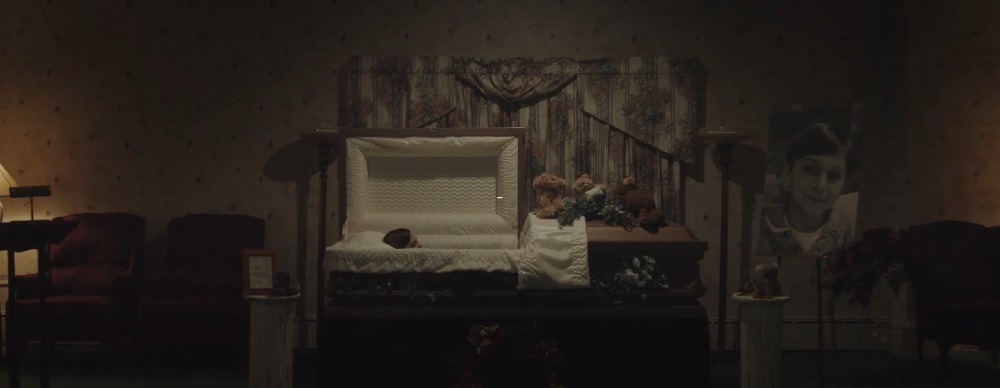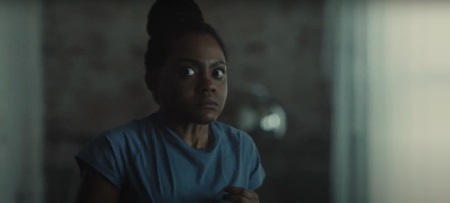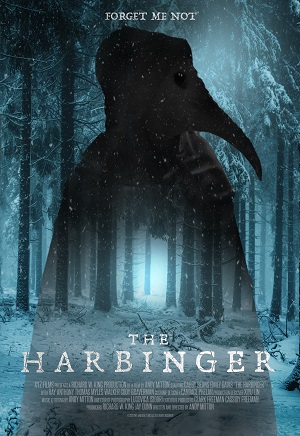
Nightmares and Catharsis Collide in Andy Mitton’s Unsettling Harbinger
The Harbinger is director-writer-editor-composer-producer Andy Mitton’s (YellowBrickRoad, The Witch in the Window) best film yet. A confident, fearlessly tense supernatural thriller, Mitton channels his inner Wes Craven with a moodily lurid descent into loneliness, isolation, and paranoia that utilizes current events involving COVID-19 better than any motion picture I’ve seen this year save for Rian Johnson’s Glass Onion. This one slips its claws under the skin and then refuses to retract, latching on in such a way that this vicious chiller leaves a lasting scar.
Monique (Gabby Beans) is determined not to get COVID. She’s been in lockdown with her father Ronald (Raymond Anthony Thomas) and brother Lyle (Myles Walker). The young woman masks up on the rare occasions she goes into public. Disinfectant is her new best friend. Minimizing all contact with others becomes an essential priority.
But then Mavis (Emily Davis) calls. She’s one of Monique’s dearest friends, and Mavis needs her now more than ever. Something is happening inside her Queen’s apartment. Something she cannot explain. Something that is terrorizing her more than a global pandemic. Monique needs help and Mavis is the only one who might believe what she is experiencing is real and isn’t some a figment of her fracturing imagination born out of spending too much time alone in lockdown.
It’s no spoiler to state that Mavis’ restless nights are due to something other than a raging virus that has everyone scared to spend more than 60 seconds outside their front door. An inhuman presence is stalking the young woman, an entity that feeds on anxiety and fear. Monique has planted herself between this ghoulish hunter and its timorous prey, and because of that, she now finds herself a target for its demonic desires as well.
There’s something very A Nightmare on Elm Street meets a random, non-UFO episode of The X-Files about all of this, but Mitton does a fine job of making this story singularly his own. Jump scares are few and far between, and they’re used with a level of character-driven precision that’s delectably insidious. Ludovica Isidori’s (The Devil You Know) lithe, delicately sparse camerawork only adds to the oppressive aura of indefatigable despair, Mitton’s sparse editing style and stealthily unsettling score both doing a fine job of augmenting this sensation considerably.
What makes everything work, however, are the singular moments of catharsis and joy. There is an underlying layer of hope. For a few brief, exuberantly pure moments, the reason for this reunion between old friends is entirely forgotten. When Monique and Mavis reconnect, there is a tearful euphoria in their embrace. Time and distance play a part, of course, but it’s also understandably more than that. It’s as if they’ve forgotten what it’s like to actually engage physically with another human being outside of their “lockdown bubble,” and because of this, simple gestures like holding another’s hand or sharing the same bits of food take on an entirely new meaning.
Not that Mitton cuts anyone a break. The filmmaker is unrelenting as he hammers home the darker aspects of his paranormal thriller. If anything, it is during the climactic home stretch where The Harbinger loses some of its luster and starts running out of steam. I had a pretty good idea of where everything was headed relatively early, and to find I wasn’t that far off the mark was a tad disappointing.
But even if the ending isn’t exactly shocking, that does not mean it still isn’t able to pack a suitably nasty wallop. Mitton knows how to scare. He knows how to leave scars. There is hope coming out of this pandemic. We can and will make lasting personal connections going forward. Yet we should still remain wary, and silver linings don’t always offer the comforting solace we’re hoping for. Even after the horror has ended, sometimes the nightmares continue.
Film Rating: 3 (out of 4)








